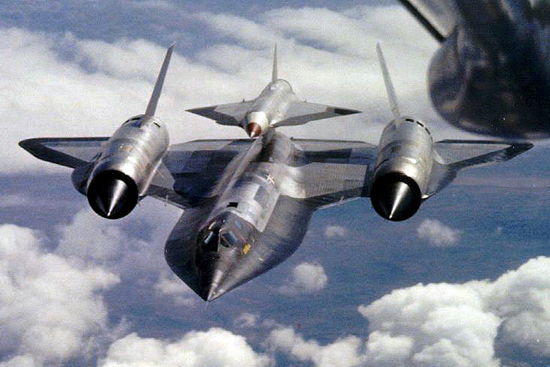Student’s Research Leads to Wikipedia Entry
CAS sophomore sheds cyber-light on Cold War document

Espionage technology, like this 1960s Lockheed spy plane, was among the suggestions in an obscure Cold War report that’s the topic of a Wikipedia entry written by a BU undergraduate. Photo by Flickr contributor James Gordon
Lt. General James H. Doolittle’s report to President Eisenhower was stark. It was time to go Rambo on Russia, “an implacable enemy whose avowed objective is world domination by whatever means and at whatever cost.” World War II hero Doolittle, who had led an air raid on Tokyo after Pearl Harbor (his exploits inspired the Spencer Tracy film Thirty Seconds Over Tokyo), declared in his 1954 report that “there are no rules in such a game.…If the United States is to survive, long-standing concepts of ‘fair play’ must be reconsidered.” Advocating that the CIA ruthlessly “subvert, sabotage, and destroy our enemies by more clever, more sophisticated, and more effective methods than those used against us,” he warned Ike that Americans might have to swallow “this fundamentally repugnant philosophy.”
Never heard of Doolittle and his report? Neither had we, until reading Wikipedia’s entry about it, penned by Christopher Barnes (CAS’14). The Salem, N.H., resident parlayed a class project on the Doolittle Report into a piece for the online encyclopedia in February, an uncompensated, un-bylined effort that nonetheless, he says, yielded “the satisfaction of adding to the historical record.”
Last fall, Stephen Kinzer (CAS’73), a College of Arts & Sciences visiting professor of international relations, assigned students in his class on the history of American foreign policy to make presentations about three Cold War documents. Two are well known: diplomat George Kennan’s 1947 anonymous “X article” in Foreign Affairs magazine, calling for containment of Soviet expansionism, and NSC 68, the 1950 report to President Truman advocating military spending and “gradual coercion” of the Soviets. Barnes and a partner drew the Doolittle Report.

While Doolittle’s thoughts are hardly the lost scrolls of Atlantis, Barnes began his class presentation by noting that “this one is so obscure it doesn’t even have a Wikipedia entry,” recalls Kinzer. Afterwards, Kinzer told his student that if there truly was no Wiki-entry— “the new symbol for obscurity”—he should write one.
Barnes consulted Wikipedia’s online formatting instructions and writing guidelines, which stress unbiased reporting with “highly credible” sources, he says. Besides the report itself, Kinzer, a former New York Times correspondent and bureau chief, suggested a couple of books on CIA history he uses in class that discuss the report, and Barnes also found online biographical information about Doolittle, including one from the federal government. He began writing his entry after last fall’s class presentation and submitted it to Wikipedia’s volunteer reviewers in February. “It took about four days,” he says. “I remember when I submitted it, they said my article was like 175th in line waiting to be reviewed. I just kept checking, and then all of a sudden, I just noticed” that the entry had been posted.
Doolittle had been recruited by Eisenhower to assess the CIA amid calls for greater congressional oversight and questions about the agency’s effectiveness. “Upon reading it,” Barnes says, “I noticed that the language of it, just in itself, was a lot different from the other Cold War documents that we were reading…the drastic, sort of extreme nature of it.”
A spokeswoman says Wikipedia doesn’t track how many of its entries come from college students, but she notes BU has been fertile ground: last year, School of Management students wrote entries as part of a program by Wikipedia’s parent company to partner with universities.
In the end, according to Barnes, Doolittle did little. His recommendations, from tighter security clearances for the CIA to more closely linking it to the military, were saluted by agency director Allen Dulles—who then sat on most of them. Still, the document is a valuable window on the fear gripping American leaders early in the Cold War, says Kinzer. Of course, apart from Doolittle, the CIA had and would continue subverting foreign governments. And Dulles did embrace one recommendation, fatefully. He and Eisenhower signed off on Doolittle’s call for better spy technology, which led to building the U-2 plane to fly over Russia and take photographs.
In 1960, the Soviets shot down a U-2 and captured its pilot, Francis Gary Powers, in a famous Cold War incident. You don’t need us to brief you about that one; you can read it on Wikipedia.

Comments & Discussion
Boston University moderates comments to facilitate an informed, substantive, civil conversation. Abusive, profane, self-promotional, misleading, incoherent or off-topic comments will be rejected. Moderators are staffed during regular business hours (EST) and can only accept comments written in English. Statistics or facts must include a citation or a link to the citation.